Liz Berg: Oral storyteller
My guest today is oral storyteller and writer Liz Berg, a regular attendee at my RedPen Write-Ins.
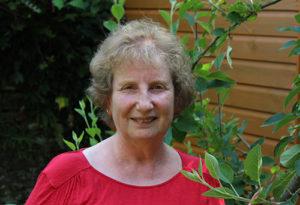
Liz Berg hails from Wales and now lives in the equally magical land of Cornwall, where she is mining the history of her Jewish heritage and Celtic links for inspiration.
Her book Jewish Folk Tales in Britain and Ireland is being published by The History Press, is now available on preorder and due for release on 31 August. Monday!
Welcome Liz. Tell us about your book, and how you came to write it.
Jewish Folk Tales in Britain and Ireland
Telling stories is very much at the core of being Jewish, a way of passing on knowledge and tradition. It was part of our culture. We would hear them in the sermon given by the rabbi, we would hear them when we went to cheder.
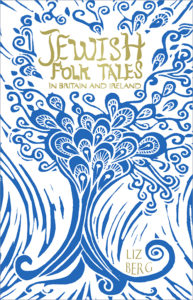 Jewish Folk Tales in Britain and Ireland is a collection of more than 40 such stories, originating from places in Britain where Jewish communities once thrived, before younger generations moved on to nearby towns and cities.
Jewish Folk Tales in Britain and Ireland is a collection of more than 40 such stories, originating from places in Britain where Jewish communities once thrived, before younger generations moved on to nearby towns and cities.
The book is not just a retelling of stories from the larger English cities such as London, Birmingham and Manchester. The tales have come from across the British Isles, from Ramsgate and Bradford to Glasgow, Belfast and Swansea. Even the furthest reaches of Penzance, Falmouth and Truro get a mention. So, as well as the stories, the book includes a historical introduction to each town.
The book also spans centuries. The Jews have long lived in Britain. They arrived with William the Conqueror and were accountants to his son, William Rufus. I’ve included tales from the time of Domitian’s Jewish slaves working in the tin mines in Cornwall through to the present-day tales. These are still being told in communities across the country, all incorporating the wit and magic of a rich and varied culture successfully integrated into Britain.
I wanted the stories to be remembered. Some of them I’ve modernised, some of them I’ve left as they were, but for all of them, I want them to be told again and again.
My aim was, and still is, to preserve the Jewish tradition of storytelling – as well as showing the Jewish contribution to British culture. Rather than just pleasing to the ear, these stories offer an insight into how Jews around different parts of Britain were accepted – or not – into their communities, and tell that history from the Jewish perspective. Immigrants bring so much with them. For Jews, we’ve brought it in the form of this oral culture, which passes on the memory and is still going on today.
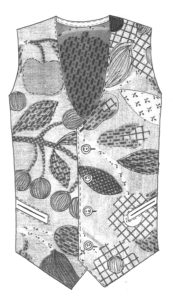
Fascinating. And the artwork on the cover is a take on the tree of life?
Yes. The front cover was designed by Cornish artist Angela Annesley, a Pendeen-based artist who has combined a career in journalism with a passion for printmaking. The illustrations within the book were produced by my daughter-in-law, Karen Berg, also a Cornish artist. This one is from The Hungry Clothes tale.
Great! Now, tell us about how and where Scrivener fits with your writing.
Scrivener: sponsors of NaNoWriMo
I first came across Scrivener during NaNoWriMo. They were offering a Beta version for Windows in 2010. I jumped at it as I didn’t have a Mac and couldn’t see when I would be getting a new machine.
Though I didn’t use, and still don’t use, all the wonderful things Scrivener has to offer, I wouldn’t be without it.
You used it to write novels and the short stories in Jewish Folk Tales in Britain and Ireland?
Yes, but …
Scrivener for play writing
I have also written plays using the scriptwriting template. The fact that the choices come up straight away whether character, action or dialogue is great. I don’t have to faff about trying to adjust columns, capitalisation etc.
I also like the fact there are templates for radio and stage in the UK. One of my plays written on Scrivener went on to be long-listed for the Sterts One Act Play competition. Another was highly commended. Maybe, I’ll hit the jackpot when this is all over.
Well done you! Anyone wanting to learn more about using Scrivener for playwriting, read this blogpost.
Scrivener for novel writing
I tend to use Scrivener more for writing novels, especially during NaNoWriMo, I have finished three and started four others.
Then, I was commissioned by The History Press to write Jewish Folk Tales in Britain and Ireland and Scrivener came into its own.
How did Scrivener help with your short stories?
Scrivener for a short story collection
Using the non-fiction format, all the research was in an easily accessible place, in the same file as the stories. All the stories were grouped within their own town folders and yet I could still see them.
I moved everything about like a headless chicken, trying to find the best way round and still Scrivener didn’t lose my work!
I used the full screen (Composition mode) to write whenever I felt the side bars were distracting, and felt confident, knowing that I could pull up the word count at any time, or go back to the original by clicking in the right hand corner. This is from an earlier version.

The historical introduction to each town was separate to the folk tales I was telling. Scrivener made it easy for me to keep these separate and yet together. Looking down the Binder, I could see where I was, what was missing and what I needed to do. I could add footnotes and still see them.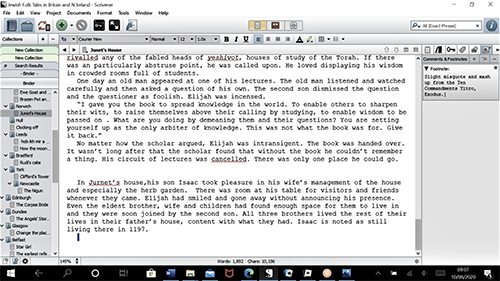
As I moved through the book and the country, I opened new chapters and inserted new stories under the different places.
I needed to change things a lot but didn’t want to lose my work. I opened new projects and moved the stories I wanted over. I could have two or more up on the screen and copy and paste all over the place. I could see where a story was and have the original and the new version on the screen, side by side. When I closed the projects, I knew exactly where everything was and didn’t have to go searching for the files in a long list of everything I’ve done. It meant that I kept all my research and the stories that didn’t make it into the book.
Very organised! And how ‘easy’ did you find Scrivener to learn?
Scrivener: the learning curve
Adding the extra bits I needed for the book took time to learn but then everything good does. I added a glossary and a bibliography.
At the moment, I am working my way through the introduction to Scrivener videos that came with the latest update on my other machine. I am a bear of very little brain so I need to keep going back and doing it all over again.
More about Liz Berg
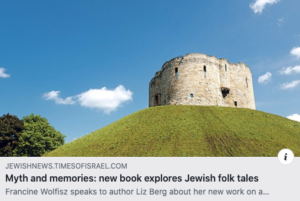
Liz Berg is a professional storyteller with a background in education (nursery to adults) and has told stories in schools, mental health homes, clubs, festivals and parks.
She has long held an interest in folk tales of all kinds which have been handed down through the generations over centuries. Her special interest is Jewish stories, both Ashkenazi and Sephardi and is part of Mazed: collecting and retelling stories from South East Cornwall.
Liz was recently interviewed by Francine Wolfisz for the Jewish News. Click here to read more.
How to contact Liz Berg
Liz Berg has a blog and an author page on Facebook. You can also contact her by email.
If you would like to have a guest blog spot, contact me!
The ScrivenerVirgin blog is a journey of discovery:
a step-by-step exploration of how Scrivener can change how a writer writes.
To subscribe to this blog, click here.
Also … check out the Scrivener Tips
on my ScrivenerVirgin Facebook page.


No Comments